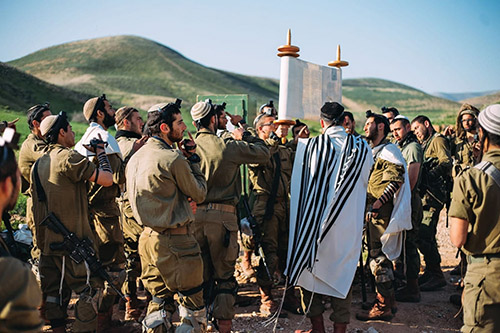



When David Breau, currently a resident of Englewood, graduated college, he couldn’t pass up what seemed to him like an historic opportunity to join the IDF and defend the State of Israel and the Jewish people. So he became one of the thousands of young Diaspora Jews to enlist as a lone soldier. At the time, in the late 1990s, a formal support network for such idealistic young soldiers didn’t really exist. Prior to enlisting, Breau had consulted with Israeli friends and, as he puts it, “had a pretty good sense of what I was signing up for.” Nevertheless, Breau feels that he absolutely lacked “a support network of [English-speaking] people who were doing what I was doing.”
In 2009, support for the specific needs of lone soldiers was given a boost through the founding of the Jerusalem-based Lone Soldier Center in Memory of Michael Levin. Yet, such institutional support for the particular needs of religious lone soldiers from English-speaking countries has only recently begun to be addressed. That support network will now be bolstered through the opening of the Beit El Mechina, a new pre-military preparatory academy, which will train and support young men from English-speaking countries as they grow spiritually, mentally and physically prior to enlisting in the IDF.
The Rosh Mechina will be Rav Yishai Klein, who has spent the past three years on shlichut teaching at Ben Porat Yosef in Paramus. Rav Klein grew up in Bet El and studied at the Atzmona Mechina in Gush Katif and later at the Otniel hesder yeshiva. He serves as a deputy commander in the IDF reserves. He holds a master’s degree in Torah shebe`al peh from Herzog College and has years of educational experience as a teacher in Israel and the U.S.
Israeli society long ago recognized the need to develop graduating high school seniors into soldiers, both physically and emotionally, even prior to their formal enlistment in the IDF. To fill this gap, a network of pre-military academies (mechinot) arose across Israel. The mind/body/soul educational model of these mechinot has proven to be highly effective, particularly for students from religious backgrounds who, for whatever reason, do not want to enroll directly in the army or learn full-time in yeshiva through the hesder model.
Leveraging the success of mechinot among native Israelis, the Beit El Mechina is unique in offering a quality English-speaking peer group and support network while simultaneously integrating students into a broader Israeli religious-educational framework. Students’ transition into army life will therefore be less jarring and isolating than the experience of previous generations of lone soldiers. Indeed, for Breau, who was the only English speaker in his unit, the isolation of not having a peer group who spoke his language was only one of the drawbacks to lacking institutional support. Like Breau, many lone soldiers are highly motivated but lack the knowledge about the structure and bureaucracy of the IDF to effectively pursue their goals as a soldier, knowledge that native Israelis possess from simply growing up surrounded by family and friends who served in the IDF before them.
In contrast, the kind of advice, support and deep connection to Israeli society that Breau had to seek out on his own will be available to a lone soldier who graduates from the Beit El Mechina. The Mechina will serve as a student’s “home” prior to, during and after military service, and will offer full support in the process of selecting and enlisting in a particular unit.
The Mechina will be located in the yishuv of Beit El, 20 minutes from Jerusalem, home to over 6,000 permanent residents and thousands of other yeshiva and high school students. It will be run under the auspices of the Beit El Yeshiva Gavoha, one of the largest and most established yeshivot in Israel. Students’ daily schedule will include tefillah, chevruta learning, and shiurim in Tanach, Gemara and Machshava. In addition to Torah study, academic lessons will be dedicated to Jewish history in Eretz Yisrael and the military history of the Jewish people and the State of Israel.
Students will be integrated into shiurim, as well as Shabbat and Yom Tov tefillot, at the Yeshiva Gavoha. Learning will take place in the Yeshiva’s beit midrash as well as in separate classrooms. Certain activities will also be run jointly with the flourishing mechina that already exists in Beit El for native Hebrew speakers.
Studies will include an ulpan to strengthen students’ Hebrew comprehension and conversational abilities. In addition, the Beit El Mechina will emphasize physical preparations for military service. A weekly and annual exercise regimen will be developed for students, including hikes and other trips throughout Eretz Yisrael.
Mechina students will live in their own apartment suites in a building on the campus of the Yeshiva Gavoha. Three hot meals a day will be catered by the Yeshiva, whose food is prepared to a high standard. Students will also have the option to be “adopted” by a family in the yishuv to experience home hospitality on a regular basis.
In addition to Rav Klein, the Mechina’s staff will include another Ram and a madrich. Students will also benefit from the broader environment and rabbanim of the Yeshiva Gavoha.
For more details and information on how to register, please contact Rav Klein at [email protected].
By Robert Blum
Robert Blum lives with his wife Sarah Rindner and their children in Teaneck.













